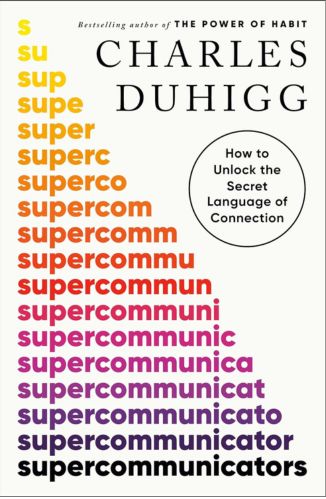What if the reason we drift apart isn’t love fading, but language unspoken?
In this episode of Passion Struck, host John R. Miles sits down with Pulitzer Prize–winning journalist and bestselling author Charles Duhigg to explore how we can reconnect when distance has crept into our relationships, and how to rediscover what he calls the secret language of connection.
This marks Charles Duhigg’s second appearance on Passion Struck. He first joined John R. Miles in Episode 420, Charles Duhigg on the Hidden Power of Supercommunicators, where they explored the habits that make great communicators stand out and the unseen forces that shape how people connect. In this new conversation, they go deeper into how communication itself becomes a bridge for trust, belonging, and emotional repair.
Duhigg, author of Supercommunicators, explains that every conversation carries hidden layers. Some are about facts and logic, others about emotions, and some touch our very identity. When those layers get crossed, understanding breaks down. When they align, trust and belonging reappear.
Together, John and Charles uncover how to repair strained connections, have difficult conversations without fear, and practice listening as a form of empathy rather than a pause before speaking.
This episode continues The Forces That Shape Us series, exploring communication as one of the most powerful invisible forces in our lives — the one that binds every other together.
Get 20% OFF Mitopure Gummies from Timeline — the first-ever Urolithin A supplement clinically proven to boost cellular energy.
Visit timeline.com/passionstruck to get started. Your cells will thank you.
Why We Drift Apart
Disconnection doesn’t happen all at once. It happens slowly, through silence, distraction, or mismatched meaning.
Charles explains that most of us aren’t poor communicators. We’re simply mismatched ones. Every exchange we have fits into one of three categories:
- Practical conversations focus on facts or problem-solving.
- Emotional conversations focus on feelings and empathy.
- Identity conversations affirm who we are and how we want to be seen.
Conflict arises when these categories collide. You share an emotion, and someone replies with logic. You ask for understanding, and they offer efficiency. We end up talking, but not connecting.
The key, Duhigg says, is learning to recognize which kind of conversation you are in — and matching it before you try to move it forward. That simple act transforms communication from a transaction into a shared moment of recognition.
The Secret Language of Connection
So what is this secret language? It’s not charisma or eloquence. It’s empathy made visible.
When two people truly listen to each other, their brains begin to sync in rhythm and emotion. Neuroscientists call it neural coupling. It’s the invisible dance that happens when you feel deeply understood.
John R. Miles connects this to his M.A.T.T.E.R. Framework, which shows how giving others your time and energy communicates one simple truth — you matter. Listening, in its truest form, is how we tell someone they are seen.
Charles shares a practical way to begin:
- Ask genuine questions that reveal curiosity, not control.
- Reflect back what you hear and name the emotion behind it.
- Match the emotional tone before guiding the conversation.
These small actions build what psychologists call psychological safety — the soil where trust grows naturally.
Get 20% OFF BUBS Naturals Collagen — clean, NSF Certified, and veteran-founded.
Use code PASSIONSTRUCK at bubsnaturals.com
✅ After checkout, select “Podcast” and tell them Passion Struck sent you!
How to Reconnect When You’ve Drifted Apart
Reconnection does not start with a perfect apology. It begins with presence and sincerity.
- Lead with curiosity. A heartfelt “I’ve missed our talks” opens more doors than explanations ever could.
- Make it safe. Remove distractions and focus fully. People respond to the level of safety you create.
- Be real. Speak honestly and allow vulnerability. Trust grows faster through truth than through polish.
- Match before you lead. Meet the other person’s emotional state before sharing your perspective.
These principles work at home, at work, and within ourselves. Reconnection is not about rewriting the past. It is about renewing the present.
The Matching Principle

At the heart of Supercommunicators is what Charles calls The Matching Principle. It is the ability to sense the kind of conversation someone is having and align with it before responding.
This is what John calls mattering in practice. When we match someone’s emotional rhythm, we show them they are seen and valued. That act rebuilds not only trust but also dignity. And dignity is the deepest language of connection.
From Talking More to Talking Better
We live in a world full of words yet hungry for understanding.
Charles reminds us that supercommunicators are not people who talk the most. They are people who make others feel safe enough to open up. Connection is not about being impressive. It is about being present.
Extraordinary conversations are not rare talents. They are learned through awareness, humility, and the courage to stay curious even when it feels easier to turn away.
When we learn the secret language of connection, we stop asking “What should I say?” and start asking “How can I help them feel heard?”
Connection as a Daily Practice
Connection is not something we stumble into. It is something we nurture through small, intentional acts.
Charles believes that every day gives us a chance to practice being supercommunicators — not in grand gestures, but in moments that often go unnoticed. Asking one genuine question at the dinner table. Checking in with a friend before offering advice. Pausing before replying to understand what emotion is being expressed.
These tiny habits accumulate into something much greater. Over time, they reshape how we relate to others and how we feel about ourselves. Connection is built one moment at a time, and every conversation is a chance to begin again.
Why This Matters

In a world where attention feels scarce and conversations are often reduced to transactions, learning how to connect deeply is not a luxury — it is survival.
Charles Duhigg reminds us that communication is the thread holding our lives together. It determines whether our relationships heal or fracture, whether our teams thrive or crumble, whether we feel seen or invisible.
When we learn to listen with empathy, match the emotional language of others, and approach every interaction with curiosity instead of control, we stop living on autopilot. We begin to live intentionally.
This matters because connection is not just what makes life meaningful. It is what makes it possible.
RESOURCES FROM THE SHOW WITH CHARLES DUHIGG
Please note that some of the links on this page (books, movies, music, etc.) lead to affiliate programs for which The Passion Struck podcast receives compensation. It’s just one of the ways we keep the lights on around here. Thank you so much for being so supportive!
- Charles Duhigg’s Site and Social HUB
- Charles Duhigg’s Book ‘Supercommunicators’
- *Free companion tools on The Ignited Life (Substack): theignitedlife.net
- *Passion Struck Network: creator-first shows built around mattering, not metrics—passionstrucknetwork.com
- *Apparel with a message: StartMattering.com — “You Matter. Live Like It.”
About Today’s Guest, Charles Duhigg

Charles Duhigg is a Pulitzer Prize–winning journalist, bestselling author, and one of the world’s leading voices on the science of communication and habit formation. He is the author of three internationally acclaimed books, including The Power of Habit, Smarter Faster Better, and his most recent bestseller, Supercommunicators: How to Unlock the Secret Language of Connection.
A graduate of Yale University and Harvard Business School, Charles has written for The New Yorker and The New York Times, where his work earned some of the highest honors in journalism. He led the New York Times team that won the Pulitzer Prize for explanatory reporting for “The iEconomy,” a groundbreaking series on globalization and technology.
Next Steps
You can listen to my full interview with Charles Duhigg on Passion Struck (Episode 679) wherever you get your podcasts. We explore the neuroscience of compliance, the psychology of moral courage, and how to cultivate defiance that heals rather than divides.
And if you’re looking for a way to help the next generation understand their worth, my new children’s book You Matter, Luma—the first story in The Matteringverse™—is now available for presale. It’s a reminder for kids (and adults alike) that the smallest acts of self-respect and kindness can create ripples of change.
Stop existing. Start mattering.



